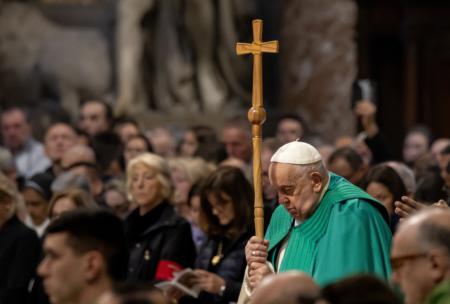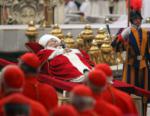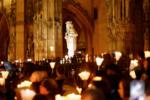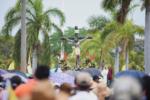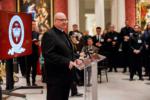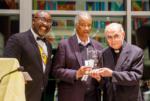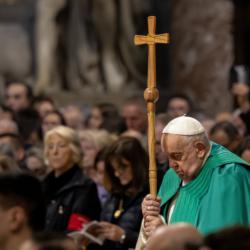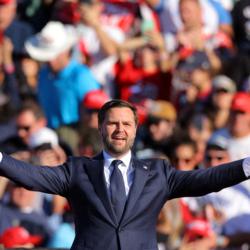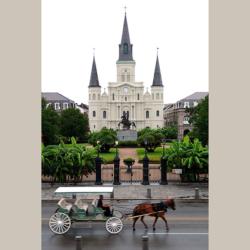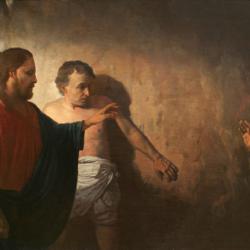April 6, 2004 - Archbishop Sean O’Malley’s Homily at the Chrism Mass
Many times, when I visited Rome, it has been my joy to visit the chapel at the English college in Rome. So many of those English priests who lost their lives preaching the Gospel were alumni of that venerable college. During the time of persecution, whenever an English priest was martyred, usually tortured, drawn and quartered, the students and the faculty of the English college would gather in that same chapel and chant a Te Deum in thanksgiving. They were praising God for the courageous witness and selfless ministry of their former classmates and companions who bravely faced torture and death for their love of Christ and the Church. Our Chrism Mass should be a Te Deum for the ministry of our brothers.
During the Jubilee Year, our Holy Father stressed the role of martyrs in the life of the Church. With their suffering they witnessed to the Church’s faith in Jesus Christ crucified and risen. The faith is not spread by pundits or even by teachers, but by teachers who are witnesses. Martyr means witness.
As a young priest it was a privilege for me to know Monsignor Oscar Romero, the Archbishop of San Salvador. I spent a month with him at Puebla, visited him in San Salvador and often received the priests that he sent to me because their lives were in danger. A few days before his death he said: “I have frequently been threatened with death. I must say that as a Christian I do not believe in death, but in the resurrection. Martyrdom is a grace from God that I do not believe I have earned, but you can tell them that if they succeed in killing me that I pardon them, but I wish that they could realize that they are wasting their time. A bishop will die but the Church will never die.” On March 24, 1980, Archbishop Romero was murdered while celebrating Mass in a chapel of a Catholic hospital. The last Gospel that was read at that Mass is the one where the people are telling Jesus that Pilot has murdered some Galileans and mixed their blood with the blood of the sacrifices that they were offering. Monsignor Romero’s blood was mixed with the blood of Christ at the last Mass that he celebrated. He was martyred for preaching the Good News to the poor.
In today’s Gospel Jesus initiates his ministry in a liturgical setting, reading the lesson from the Book of Isaiah: “The spirit of the Lord God is upon me and has anointed me to bring glad tidings to the poor.” As a sign of unity in this Chrism Mass we bless these oils, the tools of our ministry, but we recall too that we have been anointed to bring glad tidings to the poor. In a special way we are to be martyrs, witnesses to the resurrection. It is highly unlikely that we shall be called upon to shed our blood like the English martyrs or Oscar Romero or spend decades in prison like Cardinal Van Thuan, the Vietnamese bishop. The martyrdom that you and I are called to in our ordination, the special witness that we are privileged to give takes place in the pulpit and in our ministry.
In John Paul II’s letter to close the Jubilee, Novo Millennio Ineunte, the Holy Father challenges us with the words of the Gospel, “Duc in Altum”, cast your nets into the deep. The Holy Father writes: “We must rekindle in ourselves the impetus of the beginnings of the Church and allow ourselves to be filled with the ardor of the apostolic preaching which followed Pentecost. We must revive in ourselves the burning conviction of Paul who cried out: ‘Woe to me if I do not preach the Gospel.’”
The pulpit is the important arena of our martyrdom, of our witnessing. It can be painful. It can be frustrating. But it can also produce much fruit. Both Lumen Gentium and Presbyterorum Ordinis state that proclaiming the Word of God is the first task, the Primum Officium of the ordained priest. The document states: The people of God are joined together primarily by the word of the living God and rightfully they expect this from their priest. Since no one can be saved who does not first believe, priests as coworkers with their bishops have the primary duty, the Primum Officium, of proclaiming the Gospel of God to all.
Saint Paul speaking about the preaching ministry in Romans writes: “How can they believe if they have not heard and how can people preach unless they are sent.” As priests and deacons we are anointed and sent to preach so that God’s people can hear His words and hear the assurance that today these words are fulfilled in your hearing. In the letter to Timothy, Paul writes about presbyters who toil in preaching in teaching. Today with religious illiteracy at an all time high we must toil to preach and to teach. We must preach the Word in season and out of season, when convenient and inconvenient.
Pope John Paul II, who has traveled to the ends of the earth, whose speech is often slurred due to his infirmities tells us, preaching must precede accompany and crown the administration of the Sacraments to ensure their fruitfulness in faith and life. We must be convinced that the Kingdom of God is spread by word of mouth. Jesus says: “He who hears you, hears me.” The same Lord commissions us. Go and preach the Gospel to every creature. What you hear whispered, preach it on the housetops. Faith depends on hearing and hearing the Word of God. As priests we must be men of The Book, men of The Word. The seed is the Word of God in the parable. It is keener than the two-edge sword.
There is a song about breaking bread on our knees. We need to break open the Word of God on our knees. VonBalthasar has that wonderful German expression Kniende Theologie. Theology on one's knees. If our study of the scripture is too academic, we will forget to let God speak to us in His word. The words of scripture should reveal God to us, challenge us, grace our lives. As Thomas a Kempis says in The Imitation: “It is better to feel compunction than to be able to define it.”
If you ever get to Bethlehem, visit the cave where Saint Jerome spent years and years of his life compiling the Vulgate. He studied the Word of God as a scholar but first of all as one seeking the face of God. Saint Jerome makes the assertion that ignorance of the scripture is ignorance of Christ. The preacher must be able to say, “what we have seen and heard we proclaim now to you.”
Several years ago the Readers Digest brought out an abridged version of the Bible. It was reviewed in the Washington Post. The review began: “In the beginning was the Word but the Word was too long, so Readers Digest abridged it.” As preachers we need to delve into the whole scripture in our search for God’s face and to hear his word in the liturgy, in the breviary. We learn to pray the scriptures, to breathe them into our hearts.
Many years ago I went to see a play about Edith Stein. It was long before I heard anything about her. The writer was a Guatemalan who had received a very prestigious secular prize for the play. In the play the author is constantly switching back and forth between the Nazi headquarters and the Carmelite convent. I immediately noticed that there was something very special about the sisters’ speech, about their dialogue. It was poetic. It was so uplifting. Then I realized that practically everything that they were saying were phrases taken from the Psalms. After years of chanting the Offices, the words of the Psalms leap from their lips in a time of danger and tragedy. Like Jesus on the cross, many of his seven last words are lifted from the Psalms that he prayed over and over again since his childhood. If we learn to pray using the scriptures, then God’s words will be ever in our hearts and on our lips.
Why is preaching so important today? Why is it so difficult? Our present situation makes good preaching both crucial and challenging. To me one of the best metaphors to describe the reality of the Church in the United States is the biblical notion of exile. Exile in the Old Testament is not just a geographical experience. Exile is a spiritual condition of God’s people when they find themselves in a hostile, alien environment where the overriding temptation is to assimilation. The cultural pull is to accept and to conform to a dominant cultural influence that is incongruent with our faith and with our destiny. For today’s world the central claims of the faith are increasingly unwelcomed and they are received if not with hostility at best with the yawn of indifference.
Israel survived the exile because God’s people resisted the twin temptation – assimilation on one hand, and despair on the other. Today, our challenge is similar. To resist the temptation to conform to the culture of death, to consumerism, hedonism, individualism. The Good News needs to be preached with clarity. “No one will follow an uncertain trumpet blast.” The Good News must be preached with a compelling sense of urgency and a profound trust in God and hope in His words.
Some of our people have despaired. They feel that the march of modern culture away from God is nexorable and that we are powerless to influence it. They fall into a grim stoicism of passive resistance and resignation. We must learn to identify the good things as well as the bad in our society and read the signs of the times. Although we address ourselves first of all to the community of believers, to the exiles in the midst of Babylon, must realize that the claims of the Gospel have a compelling message for the Babylonians as well. They are always overhearing the Good News. We must let them hear liberating news of the Gospel in such a way that it touches on public issues, social causes, and the policies that effect the common good.
The Holy Father’s philosophical defense of truth in Veritatis Splendor met with gratitude by many intellectuals outside the Church. The Gospel values of human dignity, human freedom and justice find fertile soil in the secular world, which feels the water of chaos and violence rising around it. The Church’s teaching on life and the family are essential for civilization in the long run. We might be living in exile but we cannot be in a ghetto. From prison, Saint Paul reminds us: “The Word of God cannot be chained.”
In the movie, Contact, U.S. scientists somewhere in the desert in the southwest are sending out radio signals to outer space to see if there is any intelligent life out there. Sometimes preaching is like that. We wonder, is anybody listening? The lights are on but is anybody home? Last year visiting a church in Palm Beach I said to the pastor, “How big is your church.” He said, “Bishop, my church sleeps seven hundred.”
As a child when we would come home from church, my brothers and I would be quizzed by my Dad about the Sunday Gospel and father’s sermon. If we didn’t remember what he talked about, we would say, “Oh, he talked about money, Dad.” That would be the end of the discussion. My father did not like that. But Dad was trying to make sure that we learned to listen. In the past, Catholics really did not expect too much from the Sunday sermon. The most important features were its length – it should be short – the jokes and the baseball scores. The Sunday Mass obligation was fulfilled by arriving for the Offertory. I remember once in Ireland being told by a man who was taking a smoke during the sermon that, “Oh, it’s all right, father, as long as you can see someone that can see the priest.”
We need to teach our people to listen to the Word of God, to listen to the homily. The more importance that we give to the Liturgy of the Word, the more importance our parishioners will give to it. Are the Lectors trained, presentable, reverent, focused on the Scripture? How do we prepare and deliver our homilies? Bible courses in our parishes also help prepare our people to listen to the Word of God. And, do we share our own faith journey with our people when we speak to them? Prophetic preaching is challenging because it requires for both preacher and hearers a conversion. Both the priest and the people need to be anointed by the Spirit that allows us to desire to hear and to be challenged by the Gospel. I have always loved that story about the Curé of Ars. They tell of a few old biddies in the parish who ask the Curé of Ars to celebrate a Mass every Wednesday morning for their special intentions. And, the saint did this for many weeks and finally he was a little curious. He said, “Well, apparently you haven’t gotten your prayer answered yet. Can you tell me what it is we are praying for.” They said, “Yes, father, we are praying that the bishop sends you to another parish.” A prophet is not without honor except in his own land.
Sometimes we should talk to our parish councils about our preaching. Ask our people what points need to be stressed and what issues raised. What areas of people’s lives need to be illumined by the Word of God? In the past I have often discussed my pastoral letters with my diocesan pastoral council and I found it so helpful, so illuminating. Preparing our homilies with other priests and deacons can also enrich the content of our reflections and allows the opportunity to witness our faith to each other and strengthen our own proclamation of the Good News of Jesus Christ to our people. Are we preaching to the choir? Yes, definitely, but if we touch their hearts then the choir will become the messengers and the inviters. I heard someone say once: “Oh, I don’t invited anyone to my parish because its dullsville.” When people are excited about the liturgy, they will bring more people to church. They will become evangelizers because we have given them the tools and the motivation. I have heard many of our priests give eloquent homilies and we rejoice when we hear one but we don’t want to reduce this ministry to the art of public speaking.
Saint Paul’s most eloquent sermon at Athens at the Areopagus went over like a lead balloon and rendered only paltry results by Paul’s standards. Our preaching must be a prayer from our hearts, a burning witness of our faith in Jesus Christ. Like the Greeks in the Gospel who went to the Apostles and said, “Sir, we would see Jesus.” Our people want to see Jesus. We must show them Jesus in our holiness, in our mercy, in our purity, in our prayerfulness.
The mythical pelican is a symbol of the Eucharist. The real pelican can be a symbol for the preacher. The mythical pelican was supposed to have wounded its breast so that it could feed its flesh to its young and so it has become a Eucharistic symbol. But in reality, pelicans consume food first and then having digested it offer it to their young. We need to digest the Word of God so that we will be able to feed our people.
Father Walter Burkhart, SJ who at 90 years of age is still climbing into pulpits said, “If God does not speak through me, I am a noisy gong, a clanging symbol. Because my homily is a prayer in preparation and in the pulpit I stand before God in praise of Him not of my own rhetorical perfection because aware of my weakness I too need the Word I preach.”
The problem is that we are not convinced that preaching must be our priority. Though the Council and the Pope tell us that it is. Even our people tell us that it is the most important role of the priest.
A national opinion research center conducted extensive surveys with the Catholic laity and was forced to conclude that the strongest correlation of church attendance and Catholic identification for both the young people and the general Catholic population were not issues of sex, birth control, abortion and the ordination of women, rather the strongest predictor of Catholic behavior and identification was the quality of the Sunday sermon preached in the respondent’s parish church. In another survey of 30 year olds returning to the Church, the two most important factors were a personal relationship with the priest and the quality of preaching. Both of these things underscore the important role of the priest in the life of the Church. The priest is irreplaceable.
The second problem is that we are not always convinced of the power of preaching. Citing the testimonies of the Fathers of the Church, Yves Congar, said he wished that the following words would be emblazed over every chancery and over every rectory door: If in one country Mass was celebrated for 30 years without preaching and in another they were preaching without the Mass, the people would be more Christian in the country where there was preaching. I am sure that Congar is not referring to public speaking but a preaching that comes from the heart of priests committed to the path of holiness.
We have only to look at the New Age bookshelves and the psychic hotlines and television stations to see that there is a hunger for God and for spirituality among our people, but today’s audience is not easy. The boomers born between 1946 and 1966 are 76 million Americans, the most educated and affluent group in U.S. history. They are heirs to Woodstock, the drug culture, the sexual revolution, feminism, the breakdown of authority and divorce. Typically, they are religious illiterates, but they are interested. Not big on dogmas. My karma ran over my dogma could be their motto. They are oppressed for time and they are addicted to entertainment. Even the news must be entertaining. They are shaped by the media that teaches them the modern myths and yet they are hungry for God, for spirituality, and for answers about suffering, death and love, themes found in the book, Tuesdays with Morrie, which has been on the New York Times bestseller list for years.
Leo Trese once said that preaching is the eighth sacrament. It is not for nothing that we must be ordained before we can preach. It is not for nothing that we wear a stole for this sacred function. It is not for nothing that the Apostles ordained deacons to feed the poor so that they themselves might have more time for prayer and for the ministry of preaching. My brothers, when we preach we are handling the Word of God, the Wisdom of the Father and the Word is Christ. It is the same Christ we handle in the Eucharist. Here too we must imitate what we handle, become one with Christ whom we handle lest as Saint Paul says, “after having preached to others, we be disqualified ourselves.”
Let me close with the stirring words of our Holy Father, Pope John Paul II in Novo Millennio Ineunte: “The risen Jesus accompanies us on our way and enables us to recognize Him as the disciples of Emmaus did in the breaking of the bread. May He find us watchful ready to recognize His face and to run to our brothers and sisters with the good news, we have seen the Lord.”
The Most Reverend Seán P. O’Malley, OFM Cap
Archbishop of Boston
